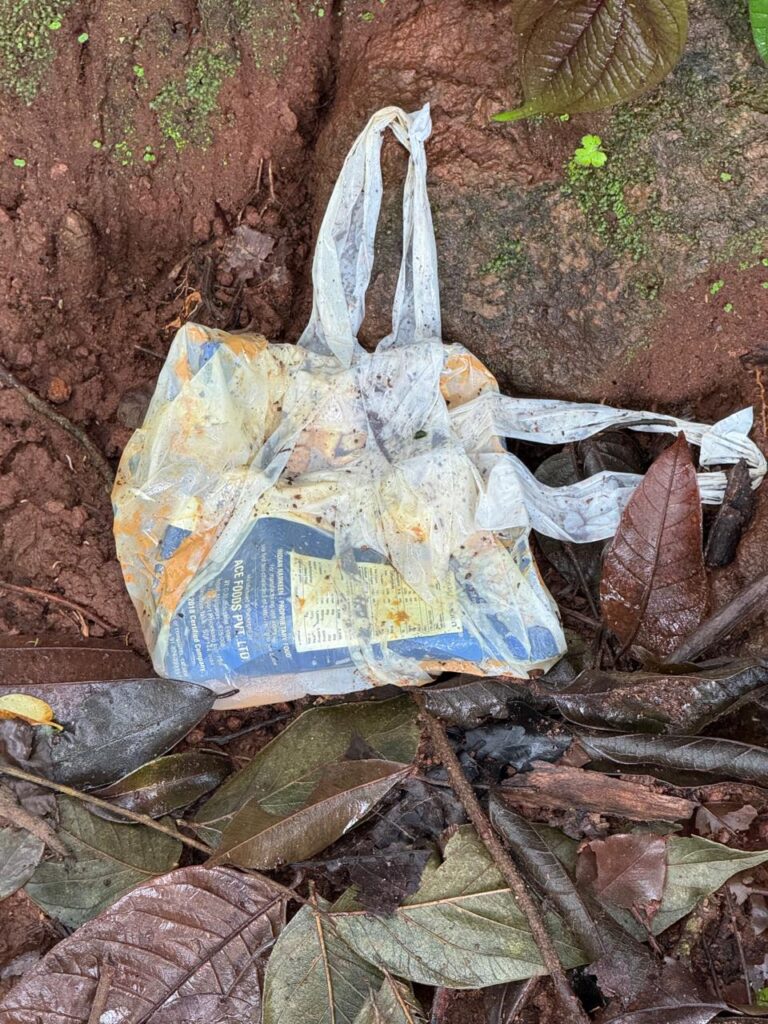We have had many people write in regarding garbage and pollution, especially where the tourist footfall is high. This is yet another wake up call or reminder from CWS.
What is perplexing is that when vast numbers of people took part in the Kodavamme Balo Nadp there was ZERO GARBAGE right through the massive programme. Why can’t this initiative be sustained?
Cubbon Park over the weekends – especially Sunday is a nightmare of garbage due to the lackadaisical behaviour of the people and park authorities combined. The very same people are Gods gift to mankind when they go abroad – UNSUPERVISED!
The need to keep our sacred land free from garbage has to come from within – tourists and residents alike. Punitive fines must be imposed by District Administration and local bodies like the Panchayat and in particular the forest department, police and municipalities. Local civic bodies and groups like the Kodava Samajas, educational institutions, local planters, shopkeepers could also lend a hand to keep Kodagu garbage free. – CLN Newsdesk
The scenic Irupu Falls, nestled within the Brahmagiri Wildlife Sanctuary and revered as the birthplace of the River Lakshmana Tirtha, is facing a growing environmental crisis. Once known for its untouched natural beauty and spiritual significance, the site is now grappling with alarming levels of plastic pollution due to rising tourist activity.

Despite a ₹75 entry fee collected jointly by the Forest Department and the Rameshwara Temple Trust, the area surrounding the falls is increasingly littered with plastic bottles, snack wrappers, and other non-biodegradable waste.

In an effort to curb pollution, the Coorg Wildlife Society recently introduced a ₹50 refundable sticker system, intended to be pasted on every plastic bottle carried into the falls area. However, implementation appears to be severely lacking.

Reports suggest that staff stationed at the entry gates are focused primarily on collecting entry fees, neglecting to enforce the sticker rule—rendering the initiative ineffective.
The situation calls for immediate intervention from jurisdictional forest officers, including the DCF, ACFs, RFO, and Dy RFO, as well as the Rameshwara Temple authorities. CWS and concerned citizens are urging authorities to strictly enforce a ban on single-use plastics and ensure cleanliness is maintained inside the eco-sensitive zone.
It is also suggested that the Deputy Commissioner of Kodagu consider implementing a complete ban on single-use plastic bottles, snack sachets, and packaged food items in and around the Irupu Falls premises.
Without swift and strict measures, this fragile ecosystem—already under strain—could face irreversible damage.



Plastic is everywhere. While it is considered cheap and convenient, we are paying a high price in terms
of growing environmental pollution and increasing health problems.
Plastic waste decreases the visual attractiveness of destinations, contributes to pollution of soil and water, affects wildlife and human health negatively. Overall it leads to biodiversity loss. Tourism is not just a victim. At the same time, it is also a big contributor to the plastic problem due to the large amount of waste
created at destinations through tourism activities.
It is estimated that the future costs of removing all single use plastics accumulating in the environment is higher than the costs of preventing littering.
It is truly disheartening to see how tourism, which ideally should promote appreciation and conservation of natural beauty, is instead contributing to the destruction of precious natural resources. The article highlights a critical issue that many popular destinations face—unchecked garbage and pollution caused by high tourist footfall. The contrast between the spotless Kodavamme Balo Nadp event and the litter-strewn weekends at Cubbon Park is striking and shows that with collective will and responsibility, maintaining cleanliness is entirely possible.
What saddens me most is that despite knowing the negative impact, both visitors and authorities often fail to act decisively. Tourism should be a force for good, fostering respect for nature and local culture. It is imperative that punitive measures be implemented alongside community-driven initiatives to instill a sense of ownership and pride in keeping our environment pristine. Only then can we hope to preserve these sacred lands for future generations to enjoy, rather than watch them degrade under the weight of careless tourism.
You’ve rightly highlighted a critical issue—the plastic pollution at Irpu and across Kodagu has reached alarming levels. It’s imperative that the authorities recognize the urgency and act swiftly to address this growing menace.
At the Coorg Hotels and Resorts Association (COHERA), we are proactively working toward a complete ban on plastics in Coorg. As part of this initiative, we also plan to install awareness signages along key highways to inform and encourage visitors to support a cleaner, greener Kodagu.
I have seen a very “different” Kodagu in my childhood and as a young professional – plastic was a rarity, so also packaged snacks. I can say with utmost sincerity – PLASTIC has become a curse on humanity.
Plastic can be seen irresponsibly strewn all over the beautiful countryside. It is not only the tourists – we locals too are careless and so also the tourists. Our temples, scenic locations, towns and villages are littered with harmful garbage. Unfortunately the animals from the forest come scavenging for this easy “food” – truly sad.
We have to change – else we will be leaving a very bad legacy for our grandchildren. We inherited a better landscape and bear the responsibility of leaving an equally, if not more clean and beautiful heritage for future generations.
Cleanliness is next to Godliness is a wise saying that refers to the importance of cleanliness in a person’s life. It was first quoted by an English cleric John Wesley in the year 1778. The Swachh Bharat Abhiyan (Clean India Mission) was launched on 2nd October 2014 on Mahatma Gandhi’s 145th birth anniversary and it has been a massive campaign for a few years to keep our surroundings, houses, offices, localities, city, state, and nation clean. It was first envisioned by Mahatma Gandhi – a clean India.
The bottom line is that the bless this becomes a way of life, the chances of success is difficult. We were taught about these values by our grandparents and teachers. This is an essential part of inculcating good civic sense.
We keep seeing articles occasionally and sporadic action. Even our MLA inaugurated a garbage collection system in the Gonikoppal waste water drain. To sustain this effort, it has to be a peoples movement like what happened in Indore – cleanest city in the country for 8 consecutive years.